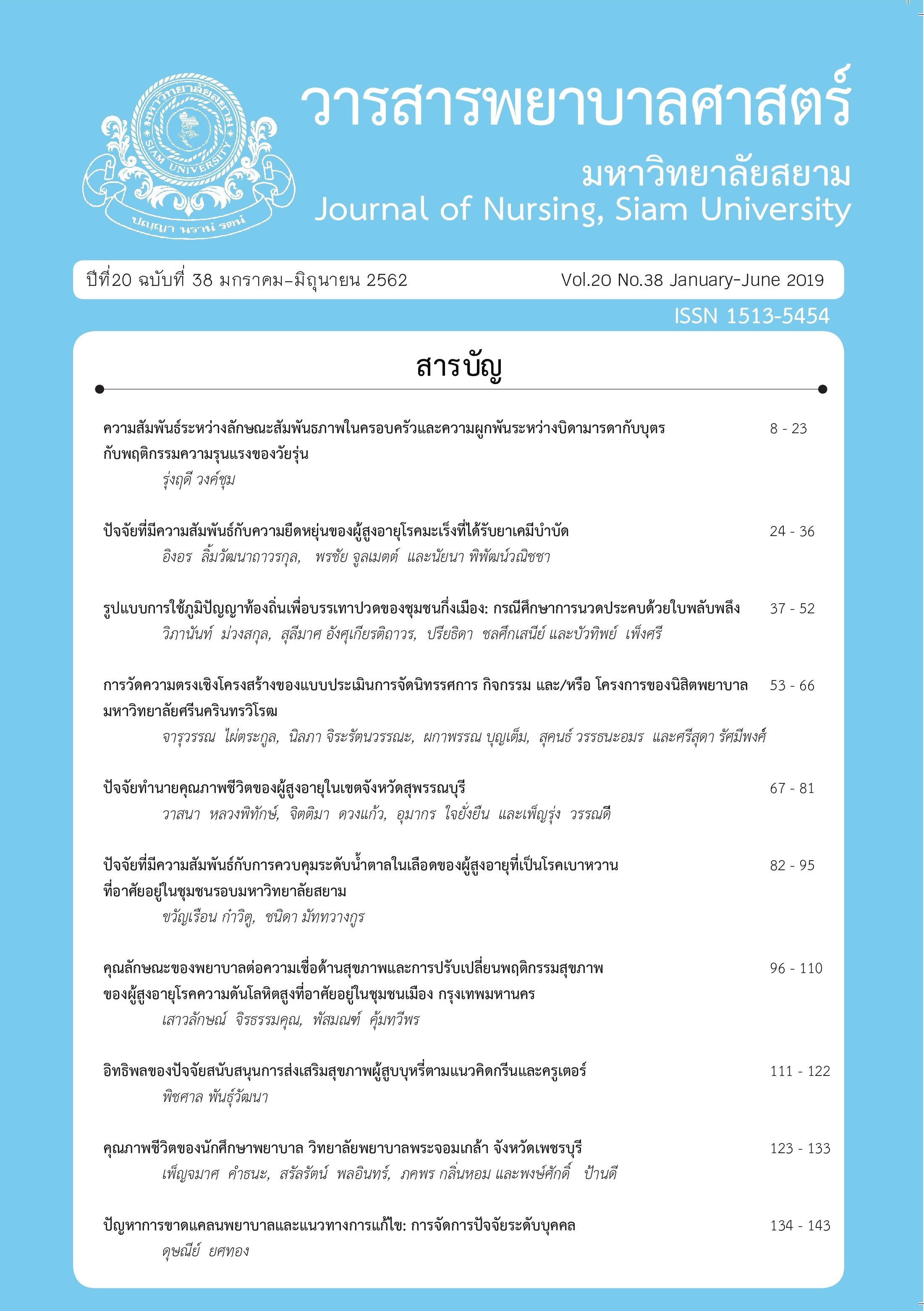ความสัมพันธ์ระหว่างลักษณะสัมพันธภาพในครอบครัว และความผูกพันระหว่างบิดามารดากับบุตรกับพฤติกรรมความรุนแรงในวัยรุ่น
คำสำคัญ:
สัมพันธภาพในครอบครัว, พฤติกรรมความรุนแรง, วัยรุ่นบทคัดย่อ
บทคัดย่อ
พฤติกรรมความรุนแรงในเด็กวัยรุ่นไทยถือเป็นปัญหาสำคัญ การศึกษาในประเทศตะวันตกไม่ว่าจะเป็นประเทศสหรัฐอเมริกาหรือประเทศในแถบยุโรปพบว่ามีปัจจัยหลายอย่างที่ทำให้เกิดพฤติกรรมความรุนแรงในเด็กวัยรุ่น การศึกษาครั้งนี้มีวัตถุประสงค์เพื่อศึกษาความสัมพันธระหว่างสัมพันธภาพในครอบครัวกับพฤติกรรมความรุนแรงในเด็กวัยรุ่น
การศึกษาครั้งนี้ใช้การศึกษาแบบผสมผสานระหว่างการวิจัยเชิงปริมาณและการวิจัยเชิงคุณภาพ ศึกษาในกลุ่มตัวอย่างที่เป็นวัยรุ่น จำนวน 400 คน และบิดามารดา จำนวน 12 คน วิเคราะห์ข้อมูลเชิงปริมาณโดยใช้ Pearson’s correlation และวิเคราะห์ข้อมูลเชิงคุณภาพโดยใช้ Thematic Analysis
ผลการศึกษาพบว่า การมีสัมพันธภาพที่ไม่ดีระหว่างบิดามารดากับบุตร และการมีทักษะการติดต่อสื่อสารที่ไม่ดีระหว่างคนในครอบครัวส่งผลให้เด็กมีพฤติกรรมรุนแรง ในทางตรงกันข้ามการมีสัมพันธภาพที่ดีต่อกันระหว่างบิดามารดากับบุตร และการมีทักษะการติดต่อสื่อสารที่มีประสิทธิภาพระหว่างคนในครอบครัวช่วยป้องกันพฤติกรรมความรุนแรงในเด็กวัยรุ่นได้
เอกสารอ้างอิง
Centers for Disease Control and Prevention (CDC). (2010). Understanding Youth Violence.
Retrieved 10 May 2011 from https://www.cdc.gov/ViolencePrevention/pdf/YV-FactSheet-a.pdf
Child Watch (2009). Conditions in the year 2550-2551 Thai children. Retrieved 25 Oct, 2009, from https://www.enn.co.th/news/117/ARTICLE/5813/2009-01-07.html
Chantapreda, N., Sawangcharoen, K., Wattananukulkiat, P., Thanwattanakul, J., & Itrat, P. (2003). Sibling Violence in North eastern Region of Thailand. Khon Kaen: Khon Kaen University.
Department of Juvenile Observation and Protection. (2011). Annual Report 2010: Case Statistics. Bangkok: Office of Juvenile Justice System Development.
Department of Juvenile Observation and Protection. (2008). Annual Report 2007: Case Statistics. Bangkok: Office of Juvenile Justice System Development.
Department of Juvenile Observation and Protection. (2009). Annual Report 2008: Case Statistics. Bangkok: Office of Juvenile Justice System Development.
Department of Juvenile Observation and Protection. (2010). Annual Report 2009: Case Statistics. Bangkok: Office of Juvenile Justice System Development.
Goodwin, W. (1998). Teen violence. U.S.A: Lucent Books Inc.
Krug, E., Dahlberg, L., Mercy, J., Zwi, A., & Lozano, R. (2002). World report on violence and health. Geneva, Switzerland: World Health Organization.
Prasert, P., & Phetdee, W. (2009). There's a violent streak in many children. The Nation, retrieved 10 May 2011 from https://www.nationmultimedia.com/2009/02/05/national/national_30095039.php
Ruangkanchanasetr, S., Plitponkarnpim, A., Hetrakul, P., & Kongsakon, R. (2005). Youth risk behavior survey: Bangkok, Thailand. Journal of Adolescent Health, 36(3), 227-235.
World Health Organisation. (2007). National Report on Violence and Health Thailand. Kobe: World Health Organization.
World Health Organisation. (2002). World Report on Violence and Health. Geneva: World Health Organization.
ดาวน์โหลด
เผยแพร่แล้ว
รูปแบบการอ้างอิง
ฉบับ
ประเภทบทความ
สัญญาอนุญาต
เนื้อหาและข้อมูลที่เผยแพร่ในวารสารพยาบาลศาสตร์ มหาวิทยาลัยสยามถือเป็นข้อคิดเห็นและความรับผิดชอบของผู้นิพนธ์บทความโดยตรง
บทความ เนื้อหา ข้อมูล รูปภาพ ฯลฯ ที่ได้รับการเผยแพร่ในวารสารพยาบาลศาสตร์ มหาวิทยาลัยสยาม ถือเป็นลิขสิทธิ์ของวารสารพยาบาลศาสตร์ มหาวิทยาลัยสยาม หากบุคคลหรือหน่วยงานใดต้องการนำทั้งหมดหรือส่วนหนึ่งส่วนใดไปเผยแพร่หรือเพื่อกระทำการใด ๆ จะต้องอ้างอิงวารสารพยาบาลศาสตร์ มหาวิทยาลัยสยามทุกครั้ง



